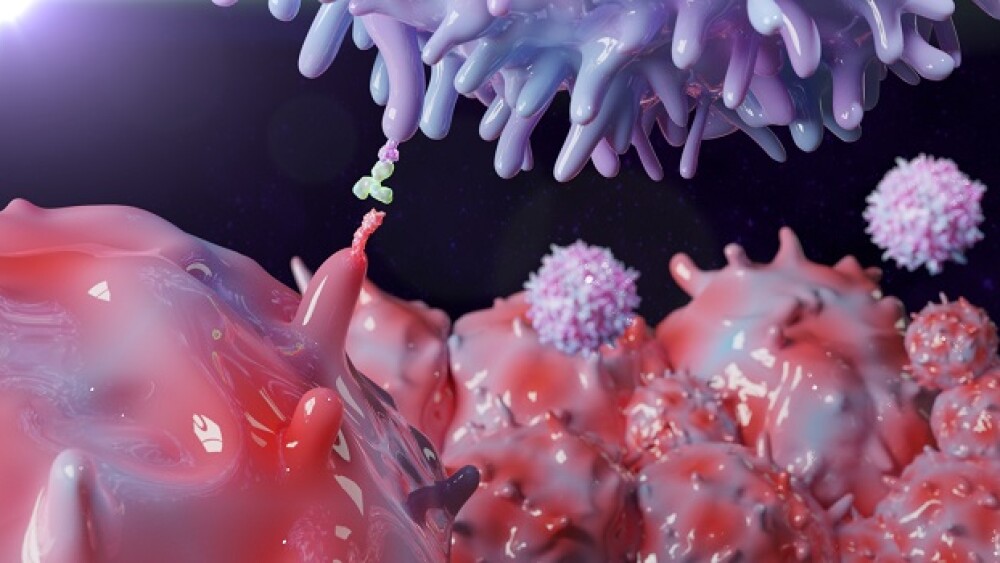The checkpoint inhibitor is approved for several cancers in China, but after an indefinite FDA delay last summer, BeiGene’s partner Novartis still awaits its first U.S. approval.
Pictured: Illustration of therapeutic antibody binding to PD-1 / Adobe, Alpha Tauri 3D
BeiGene adds another Phase III notch in its tislelizumab belt with positive results in patients with a type of gastric cancer. Thursday the biotech announced the study met its primary goal of improved overall survival in patients with advanced unresectable or metastatic gastric or gastroesophageal junction (G/GEJ) adenocarcinoma, regardless of PD-L1 status.
BeiGene holds rights to the drug in China, where it’s already approved in 10 indications. The company looks forward to discussions with regulatory authorities about these data, hoping to add G/GEJ to that list, Chief Medical Officer Mark Lanasa told BioSpace.
But in the U.S. and Europe, where Novartis will be marketing the therapy, approvals have been elusive.
In 2021, Novartis purchased from BeiGene the rights to co-develop and commercialize tislelizumab for multiple cancer indications in North America, Japan, the E.U., and six other European countries. Last summer, the Biologics License Application (BLA) for the checkpoint inhibitor as a first-line treatment with chemo for patients with certain types of esophageal cancer was delayed indefinitely by the FDA.
The agency was unable to inspect the manufacturing facilities in China due to COVID-19 related travel restrictions. No updated timeline for review was provided at that point.
The FDA is now slated to perform the manufacturing inspections this quarter, Lanasa told BioSpace.
Lanasa said the inspection should allow progress towards the final decision from the FDA as a second-line treatment for esophageal squamous cell carcinoma (ESCC).
“Hopefully once we can get over this hurdle, which we are confident that we will, it will allow additional submissions to go forward—the frontline study in ESCC, as well as this frontline study in gastric cancer,” he said, referring to the new Phase III data released this week.
The latest results, which pitted tislelizumab and chemotherapy against a placebo-chemo combo as a first-line treatment in G/GEJ adenocarcinoma patients, showed that tislelizumab increased a median overall survival to 17.2 months, compared with 12.6 in the chemo plus placebo group. No new safety signals were identified.
In its Q2 2022 investor presentation, Novartis said it had scrapped its filing of tislelizumab for non-small cell lung cancer. In a conference call, CEO Vas Narasimhan pointed to the FDA’s assessment of the data as the reason. The FDA requires studies to be “global in nature, have an appropriate amount of U.S. patients, and that the standard of care used reflects standard of care in the U.S.,” Varasimhan said.
Novartis did, however, include gastric cancer in its pipeline for tislelizumab late last year, according to its Q4 investor presentation. RATIONALE 305, the G/GEJ carcinoma study, was “a global multi regional study, including the United States,” Lanasa said.
In total, tislelizumab has been or is being tested in 234 cancer types, according the clinical trials listing, and has 21 registration-enabling trials in the works.
Kate Goodwin is a freelance life science writer based in Des Moines, Iowa. She can be reached at kate.goodwin@biospace.com and on LinkedIn.







